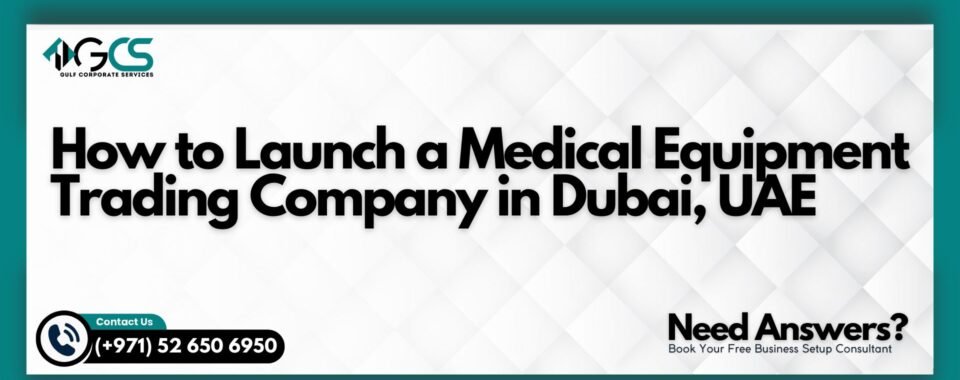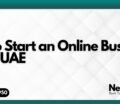
Dubai is a thriving hub for healthcare innovation and trade, making it one of the most strategic places to start a medical equipment trading company. The UAE’s healthcare market is projected to exceed USD 10 billion by 2030, driven by government investment, population growth, and rising demand for advanced medical technology.
This detailed guide explains everything you need to know — from licensing, documentation, and regulations to costs and benefits — to help you successfully establish a medical equipment trading business in Dubai.
Why Dubai Is the Best Place for a Medical Equipment Trading Business
Dubai offers an advanced healthcare infrastructure, tax-free economy, and world-class logistics system. With hospitals, clinics, and laboratories constantly upgrading, the demand for quality medical devices and supplies continues to rise.
Strategic Location for Global Distribution
Situated between Asia, Europe, and Africa, Dubai is a global logistics powerhouse. Companies use it as a re-export hub, connecting suppliers from Europe and Asia with healthcare institutions across the GCC, Africa, and South Asia.
Government Support and Investment
The Dubai Health Authority (DHA) and Ministry of Health (MOH) encourage private investment through simplified registration processes, innovation grants, and public-private partnerships.
Free Zone Advantages
Free Zones like Dubai Healthcare City, Dubai Science Park, and JAFZA provide 100 % foreign ownership, profit repatriation, and modern warehousing tailored for healthcare and medical logistics.
Tax-Free Environment
The UAE offers zero personal and corporate income tax for most business categories, enabling higher profit margins and reinvestment in growth.
Understanding the Medical Equipment Trading License
To legally import, distribute, or sell medical devices, you must obtain a medical equipment trading license issued by either the Department of Economic Development (DED) for mainland companies or by a Free Zone authority.
Purpose of the License
This license authorises your company to trade in approved categories of medical equipment — including diagnostic tools, hospital furniture, surgical instruments, laboratory devices, and imaging systems.
Regulatory Oversight
All medical equipment trading activities fall under the supervision of the Ministry of Health and Prevention (MOHAP) and the Dubai Health Authority (DHA) to ensure safety, quality, and compliance with UAE health standards.
Types of Medical Equipment Covered
When applying for your license, you must specify the categories of products you intend to trade.
Diagnostic Equipment
Includes X-ray machines, MRI scanners, ECG devices, and diagnostic kits. These products require registration with MOHAP to confirm technical standards and calibration accuracy.
Surgical and Therapeutic Equipment
Covers surgical instruments, operation-theatre setups, anaesthesia machines, and therapeutic devices. Only approved distributors can import these items.
Laboratory Equipment
Involves microscopes, centrifuges, testing reagents, and automated analysers. These products are essential for hospitals and pathology labs.
Hospital Furniture and Fixtures
Items such as hospital beds, wheelchairs, trolleys, and storage systems fall under this category. They are easier to trade and have fewer regulatory restrictions.
Dental and Orthopaedic Devices
Specialised tools, prosthetics, and orthodontic equipment used by dentists and orthopaedists are high-demand segments with lucrative margins.
Step-by-Step Process to Launch a Medical Equipment Trading Company in Dubai
Starting your business involves several steps, from planning and registration to obtaining approvals.
Step 1 – Choose the Business Jurisdiction
Decide whether to operate on the mainland or within a Free Zone.
- Mainland (DED): Ideal for companies targeting hospitals, pharmacies, and government healthcare institutions within the UAE.
- Free Zones: Best for re-exporting and global distribution.
Step 2 – Select a Business Activity and Name
Choose “Medical Equipment and Instruments Trading” as your primary activity and reserve a compliant business name with the DED or relevant authority.
Step 3 – Prepare the Legal Structure
Decide on your legal form: LLC, sole establishment, or branch of a foreign company. Most investors prefer LLCs for flexibility and liability protection.
Step 4 – Secure Initial Approval
Submit your application to the DED or Free Zone authority, including shareholders’ documents and an initial business plan outlining your trading operations.
Step 5 – Obtain MOHAP and DHA Approvals
Medical devices must be registered with MOHAP for federal approval. The DHA may require additional product clearances for Dubai-based imports.
Step 6 – Rent an Office or Warehouse
Your company must have a physical office and, if applicable, storage space for inventory. Certain Free Zones offer temperature-controlled medical storage facilities.
Step 7 – Apply for the Final Trade License
After approvals and payment of fees, you’ll receive your medical equipment trading license, allowing you to begin importing and distributing medical products legally.
Step 8 – Register with Dubai Customs
If importing equipment, register with Dubai Customs to obtain a code that enables smooth import clearance and logistics handling.
Documents Required for Registration
Prepare the following documents before submission:
- Passport copies of shareholders and directors
- Emirates ID (if resident)
- Trade name reservation certificate
- Memorandum & Articles of Association (MoA & AoA)
- Lease agreement (Ejari)
- MOHAP product registration documents
- Initial and final approval forms
Ensure all documents are attested and translated into Arabic where required.
Cost of Starting a Medical Equipment Trading Company in Dubai
The total investment varies depending on location, scale, and product range.
License and Registration Fees
Expect to spend between AED 15,000 and AED 25,000 for government registration, DED approvals, and licensing.
Warehouse and Office Rental
Rental costs range between AED 10,000 and AED 50,000 per year, depending on area and storage capacity.
Product Registration and Compliance
Each product registered with MOHAP costs between AED 1,000 and AED 3,000. Products with high-risk classifications require additional certification.
Visa and Labour Costs
Allocate AED 5,000 – 10,000 per employee for visa processing, medical tests, and Emirates ID registration.
Regulatory Compliance and Approvals
Compliance with federal and local regulations ensures your business operates legally and ethically.
MOHAP Registration
All medical devices must be registered under the Ministry of Health and Prevention before import or sale. Registration verifies product quality and manufacturer credibility.
DHA Approval for Dubai-Based Firms
If your company trades within Dubai, DHA approval is necessary for importing and distributing products to hospitals and clinics.
ESMA Certification
Certain medical electronic devices must comply with the Emirates Authority for Standardization and Metrology (ESMA) safety standards.
Customs Clearance and Import Code
Every trading company importing goods must have a valid Customs Code and register with Dubai Trade for clearance documentation.
Best Free Zones for Medical Equipment Trading
Dubai offers multiple Free Zones catering specifically to healthcare and trading businesses.
Dubai Healthcare City (DHCC)
A premier healthcare-focused Free Zone providing access to hospitals, research centres, and medical institutions. It allows 100 % ownership and quick license approvals.
Dubai Science Park (DSP)
Ideal for companies dealing in biotechnology, pharmaceuticals, and medical research. It provides lab facilities and smooth MOHAP coordination.
Jebel Ali Free Zone (JAFZA)
Perfect for large-scale import/export operations. JAFZA offers logistics infrastructure, warehouse options, and proximity to the Jebel Ali Port.
Dubai South
Favoured by startups and SMEs due to affordable costs and proximity to Al Maktoum Airport, enabling faster distribution across the region.
Key Benefits of Launching a Medical Equipment Trading Business
Starting a medical equipment trading company in Dubai offers numerous financial and strategic benefits.
High Market Demand
The UAE’s expanding healthcare infrastructure continues to generate strong demand for new medical technologies, equipment, and disposable supplies.
Global Connectivity
Dubai’s logistics network supports seamless import and export operations, ensuring medical devices reach clients efficiently worldwide.
100 % Foreign Ownership
Investors enjoy complete control, profit repatriation, and no currency restrictions when operating through Free Zones.
Access to Healthcare Clusters
Proximity to medical and research institutions provides direct access to clients, industry knowledge, and collaboration opportunities.
Innovation and Research Support
Free Zones like DSP and DHCC encourage research partnerships and product development by offering incubation and innovation grants.
Challenges in the Medical Equipment Trading Industry
While the sector is profitable, there are challenges that entrepreneurs must prepare for.
Regulatory Delays
Obtaining MOHAP approvals for each product can take time, especially for advanced or high-risk devices. Planning ahead prevents operational delays.
Market Competition
The UAE market already hosts many global distributors. To succeed, focus on niche segments, strong supplier networks, and customer relationships.
Storage and Handling Requirements
Some medical equipment requires temperature-controlled environments or special handling to prevent damage and ensure compliance with safety standards.
Documentation and Compliance
Incomplete or expired registrations can lead to fines or suspension of your trading license. Keeping up with renewal schedules is essential.
Marketing Strategies for Medical Equipment Companies
Strong marketing helps build visibility and credibility in Dubai’s competitive healthcare market.
Build a Professional Brand
Develop a professional website, product catalogue, and corporate identity that reflects trust and expertise in medical technology.
Partner with Hospitals and Clinics
Form long-term supply contracts with hospitals, clinics, and laboratories. Relationships ensure recurring sales and stability.
Attend Healthcare Exhibitions
Participate in major events like Arab Health Dubai to connect with manufacturers, distributors, and potential clients.
Leverage Digital Marketing
Use SEO, LinkedIn marketing, and paid ads to target healthcare professionals and procurement managers actively looking for reliable suppliers.
How to Ensure Long-Term Success
Running a sustainable medical equipment trading company requires consistent effort and compliance.
Maintain Quality Standards
Ensure all products meet international safety standards such as ISO 13485 and CE marking. Clients prefer verified and certified equipment.
Focus on Customer Service
Provide after-sales support, installation, and maintenance services to build client loyalty.
Diversify Product Portfolio
Offer a wide range of items — from basic consumables to high-tech devices — to attract a larger customer base.
Stay Updated with Regulations
Monitor updates from MOHAP and DHA to stay compliant with evolving medical and import laws.
Collaborate with Industry Experts
Partnering with logistics, marketing, or compliance consultants helps streamline operations and ensure smooth license renewals.
Renewal and Maintenance of License
Renew your medical equipment trading license annually to keep your operations active.
Renewal Process
Submit updated financial documents, proof of warehouse compliance, and pay renewal fees to the DED or Free Zone authority. The process usually takes 3–7 working days.
Late Renewal Penalties
Failing to renew on time may result in fines or temporary suspension of operations. Maintaining updated documentation avoids unnecessary disruptions.
Conclusion
Launching a medical equipment trading company in Dubai is one of the most lucrative ventures in the UAE’s healthcare sector. With the country’s expanding medical infrastructure, global logistics access, and investor-friendly environment, entrepreneurs can build sustainable and profitable businesses.
For smooth registration, compliance, and setup support, consult a trusted Business Setup Company in Dubai, UAE to guide you through every step of licensing and approvals.
FAQs
What license is required for a medical equipment trading business in Dubai?
You need a medical equipment trading license issued by the DED or Free Zone authority, with product registration under MOHAP.
How much does it cost to start a medical equipment trading company?
Costs typically range between AED 50,000 and AED 150,000, depending on setup type, warehouse space, and product registrations.
Can foreigners own 100 % of a medical equipment company?
Yes, in Free Zones like DHCC and DSP, foreign investors enjoy full ownership and profit repatriation.
Do I need approval from the Ministry of Health?
Yes. All medical devices must be registered with MOHAP before import or distribution.
How long does the setup process take?
It usually takes 2 to 4 weeks to obtain approvals and issue your trading license.
Is a warehouse mandatory for trading?
Yes. You must have an approved storage facility meeting hygiene and temperature-control requirements.
What are the best Free Zones for medical trading?
Dubai Healthcare City, Dubai Science Park, and JAFZA are the top options offering specialised healthcare infrastructure.
Can I import products directly from abroad?
Yes. Once you register with Dubai Customs and obtain an import code, you can import medical devices from approved manufacturers.
What happens if my license expires?
If not renewed on time, your license becomes inactive, and you may face penalties or suspension until compliance is restored.
How do I market my medical equipment business?
Participate in industry exhibitions, build partnerships with hospitals, and use digital marketing to reach healthcare buyers.








